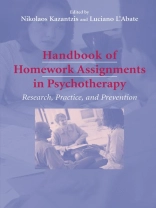The aim of this Handbook of Homework Assignments in Psychotherapy: Research, Pr- tice, and Prevention is to provide comprehensive resource on the role of homework assignments in psychotherapy and prevention. However, the process of generalizing in-session therapeutic work through between-session activity has a long history in psychotherapy. This Handbook is designed to elucidate and extend that history by presenting theoretical and clinically focused descriptions of the role of homework assignments in a range of psychotherapies, clinical populations, and presenting pr- lems. Designed for both the beginning and the experienced psychotherapy prac- tioner, this Handbook assumes a basic knowledge of psychopathology and practice of psychotherapy and prevention. The Handbook aims to contribute to the professional resources for all psychotherapy practitioners and researchers, in private and public practice, graduate students in clinical and counseling psychology, couple and f- ily therapists, as well as residents in psychiatry. This book does not aim to review the theories of psychotherapy in detail, speci?c treatments of psychopathology, cl- ical assessment, or basic psychotherapy and prevention processes that are currently available in numerous psychotherapy textbooks. This Handbook is a clinical resource designed to provide a focused coverage of how to integrate homework assignments into psychotherapy practice, and in the prevention of mental illness. Outline for the Handbook This Handbook comprises four distinct parts.
Table of Content
Brief behavioral marital therapy.- and Historical Overview.- Psychotherapy Approaches.- Behavior Therapy.- Client-Centered Therapy.- Cognitive Therapy.- Emotion-Focused Experiential Therapy.- Interpersonal Psychotherapy.- Psychodynamic Therapy.- Acceptance and Commitment Therapy.- Brief Strategic Family Therapy.- Personal Construct Therapy.- Client Populations.- Older Adults.- Couples.- Families.- Specific Problems.- Borderline Personality Disorder.- Chronic Depression.- Chronic Pain.- Eating Disorders.- Low Self-Esteem.- Obsessions and Compulsions.- Psychosis.- Sexual Dysfunction.- Substance Abuse.- Traumatic Brain Injury.- Directions for Research, Practice, and Prevention.- Directions for Research on Homework.- Directions for the Intergration of Homework In practice.- Directions for Homework in Psychotherapy Prevention.
About the author
Nikolaos Kazantzis, Ph.D., is faculty member at the School of Psychology, Massey University, Auckland, New Zealand. He has published widely on the topic of homework assignments in psychotherapy, including serving as a Guest Editor for special issues on this topic in the journals IN SESSION: Journal of Clinical Psychology (2002), Journal of Psychotherapy Integration (2006), and Cognitive and Behavioral Practice (2006). He has co-authored more than 40 articles and book chapters and has participated in national and international conferences related to his research interests. He is also a recipient of the Royal Society of New Zealand Science and Technology Award for Beginning Scientists, The Australian Association for Cognitive Behavior Therapy’s (AACBT) Tracy Goodall Early Career Award, and Massey University’s Research Medal – Early Career. Dr. Kazantzis is a licensed (registered) clinical psychologist and maintains a part-time practice in Auckland, New Zealand.
Luciano L’Abate, Ph.D., is Professor Emeritus of Psychology, Georgia State University, Georgia, Atlanta, USA where he was Director of the Family Psychology Training Program and the Family Study Center. He completed his Ph.D., at Duke University, with post-doctoral specialization at Michael Reese Hospital in Chicago. He worked in the Psychiatry Departments of Washington (St. Louis) and Emory (Atlanta) Universities Schools of Medicine before moving to Georgia State University, where he spent his entire academic career. He was in part-time private and consulting and clinical practice for 42 years. He has published (author, co-author, edited, and co-edited) 37 books, 3 are in press, as well as over 250 papers in scientific and professional journals.












